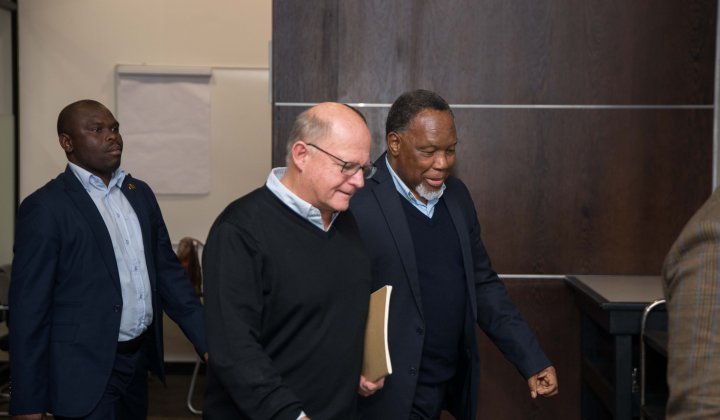Imagine your AI assistant wakes you at 6 a.m. and, taking into account traffic patterns, pre-orders an Uber for your 9:30 a.m. meeting. Your augmented reality glasses allow you to scroll through your emails while you brush your teeth. Next up, a coffee meeting with your holographic team. Technology is seamless in this virtual world, but how do you manage at arms-length? How do you communicate a vision? How do you motivate? How do you build a corporate culture?
Zoaib Hoosen doesn’t regard himself as a soothsayer, but GIBS’s executive-in-residence paints a picture of a world in which technology seamlessly interfaces with our human world of work, life and play.
“Anyone who tells you that they know with certainty where this is all going is lying,” says the former MD of Microsoft South Africa, although he is prepared to hazard a guess that artificial intelligence (AI) will drive a world in which you have “algorithms doing things, people doing some things and expertise on tap”.
This view is borne out by professional services firm PwC which, in July, released a report examining how AI might disrupt project management and impact the role of project managers. Entitled A Virtual Partnership? the report noted that 85% of CEOs polled felt AI would significantly change how they do business in the next five years. Not only would AI lead to the availability of better insights and data, said the authors, the technology would allow trends to be better determined, project schedules to be prioritised and human capital optimised, from allocating resources and training to providing feedback.
For leaders, being armed with data, insights and predictions should – in theory – lead to better decision-making. But it also shifts the role from functional, day-to-day management to a bigger-picture approach which focuses on platforms, understanding customers, collaborating, building trust, fostering partnerships and harnessing skills. It is about constant learning, grasping the importance of soft skills while keeping a trained eye on technical considerations from IT and computer systems to project and team management. It’s about digital know-how linked to personal innovation. As PwC co-author Riyadh Al Najjar wrote: “AI cannot have the human skills like ideation, people-management, empathy, problem-solving and emotional intelligence. We need to think of AI as a tool that will make our lives easier and compliment businesses.”
Anyone who tells you that they know with certainty where this is all going is lying
Coming to grips with change
Such is the anticipated transformational impact of AI on business that conferences, podcasts, corporate pow-wows and business schools around the world are seeking to make sense of its impact.
In 2018, Spain’s IESE Business School devoted its Future of Leadership Development Conference to tackling the question of how AI is transforming management. Without a heads-up as to how this might evolve, business will be left wrong-footed, said IESE’s Dean, Professor Franz Heukamp. “Leadership is about people and AI is about machines,” he said. “But the borders are becoming fuzzy.”
This, says Hoosen, has everything to do with the drivers currently reshaping the world of business: “The impact of technology acceleration, the evolution of AI and the resultant augmented human experience adds to the ‘fuzzy borders’ between human and machines.”
Acceleration is inevitable, he says. “Technology is creating new capabilities, and this shows no signs of slowing down. If anything, it will continue to double and will continue to enable a number of new scenarios.” This is being compounded by the power of AI, which is evolving on par with human abilities like machine reading, translation, speech-to-text and object recognition. Rather than being concerned that these cognitive abilities are overlapping our own, we should be focused on the tasks we can outsource to machines and those which human beings are best served to perform, says Hoosen.
“I don’t think it is about replacement. It’s about things like AI and algorithms working in the background and doing tasks for us,” explains Hoosen. “So, the way we work, live and play is going to get augmented by some of these technologies.”
This glimpse into the future is where business leaders need to start their search for meaning, he advises. “[Alibaba founder] Jack Ma says, when he does his strategy, that he thinks of where the world is going to be and backward iterates from there. A lot of people build a strategy based on this year’s results and build from this point forward, which is limiting,” says Hoosen. “Instead, we have to ask what organisations, and the people in those organisations, have to look like to take that journey.”
How to approach AI-enabled management
Global business leaders and academics at the IESE conference came away with several takeaways from their deliberations, including urging business leaders to develop an understanding of technology and its implications; not leaping to conclusions and making false links when developing new management theories; remembering their social and ethical responsibilities; and sticking to core values and focusing on building an ecosystem of talent. Critically, companies must not shy away from hiring individuals who challenge the status quo, since these attributes may spark greatness.
In addition, warned Julian Birkinshaw, Professor of Strategy and Entrepreneurship at London Business School, it is essential not to become complacent. Just because AI is currently helping to make processes easier and more efficient does not mean that is where the technology will stop. “The future will be very different,” he said, so building growth strategies and management training around a technology which is evolving rapidly is distinctly short-sighted.
Instead, said Professor Tomo Noda of Japan’s Shizenkan University, it is essential to remember the human traits that make great leaders great. “Planning, budgeting and organising can be done by AI, but establishing vision, aligning people and motivating people requires people.”
This, says Hoosen, underlines the salient point – the human skills leaders need to fine-tune to ensure current and future relevance. “If you think about it, change is a human thing. It’s about the impact on the human,” says Hoosen. “The tech is there, and it is going to impact your life. So now it comes to people having the courage to accept that they need to change.”
...we should be focused on the tasks we can outsource to machines...
Companies, too, need this courage. After all, points out Hoosen, how companies structure themselves in the future is also likely to shift, which will also impact how leadership must evolve. “Future corporations might have a smaller core and more partnerships,” he hypothesises. After all, developing AI experts within your business would be more costly than simply buying in the right skills and partnering with compatible companies. This highlights management skills like supplier development and alliance building, rather than KPIs and budgets.
AI is not an excuse to abdicate our humanity...
It also requires leaders and managers to ensure that they embrace their fundamental duty to care. “AI is not an excuse to abdicate our humanity. It is an augmentation which should enhance these traits,” says Hoosen. “I think we need leaders who are attuned to thinking about these things. Leaders who ask questions about the digital divide and how to ensure access to everyone. We’ve seen the interference in elections, and we can see how countries can launch warfare just by attacking a data source. So, this responsibility and care is paramount to ensuring a safe world in the future.”
Similarly, what is also emerging is the role of empathy. “We have workers who are scared. We have customers demanding different things. If you are lacking empathy as a leader, how can you understand this world in which you are meant to compete?” says Hoosen.
As a former Microsoft executive, Hoosen believes that the approach injected into that organisation five years ago, when Satya Nadella took over as CEO, is worth emulating. “Satya introduced the concept of having a growth mindset to the organisation, including having empathy,” recalls Hoosen. “I had to go and figure out what this meant and I’ve spent a lot of time thinking about it, to the extent that it even informed how I had to change my management style to listen more, to put myself in the shoes of another person. Because then you start to see the world through another set of eyes, whether it’s your customers, your employees or your partners, who are also battling with change. If you are a leader during this time of change, then empathy is a core characteristic.”
This culture and leadership style have contributed to the financial success of Microsoft, he adds. “Just consider Nadella’s journey: In 2014 he took over the business and its market cap was US$270 billion, as of now it is over US$1 trillion. So, he added US$700 billion of value in five years and is now the largest company in the world. That’s not too shabby.”
The reason for this success, believes Hoosen, has everything to do with the Microsoft view of digital transformation. “With some distance, and looking at other sources of input into this conversation around digital strategies, clearly there are people at Microsoft who asked what they must start doing now to have the outcome they want in the future.”
How leaders envisage the journey ahead will ultimately mould the role of the hybrid manager of the future. Now is the time to choose those qualities wisely.
KEY TAKEAWAYS
· AI is creating a world of collaboration between mankind and machines.
· This evolution is impacting how companies operate and what is demanded of leaders and managers as roles and structures change.
· AI is shifting the leadership role from functional, day-to-day management to a bigger-picture approach which focuses on platforms, understanding customers, compliance, trust, building partnerships and harnessing skills.
· Leaders and managers now require traits such as empathy, bravery and generosity, alongside the ability to collaborate, strategise for the future, and continually challenge themselves.
PERSONAL TRAITS = CORPORATE ADVANTAGES
There are two layers to the debate around leading in an AI-enabled world, believes Zoaib Hoosen, GIBS’s executive-in-residence. One talks directly to the personal skills we need to understand and manage in this new reality, and the other considers how these personal traits impact corporate culture.
“If a company wants to foster certain corporate traits and cultural attributes, then it needs to focus on developing these skills among its people,” says Hoosen, who believes in developing collaboration, risk-taking, special relationships and ecosystems.
Take, for example, generosity. “The ability to survive in this new world comes down to collaboration. But there is a spirit of generosity which needs to come with this collaboration. In an ever-changing world, generosity might actually enable more collaboration,” Hoosen explains. This personal trait will, in turn, develop an openness to partnerships within companies and sectors. Consider the tie-up between automotive rivals BMW and Mercedes-Benz in the self-driving space, which would have been unthinkable a decade ago.
Other individual characteristics include boldness, which could equate to risk-taking in a corporate setting, or courage in the face of acceleration, which would drive mindset shifts within a company. Add in encouraging lifelong learning, together with accountability, trust and rigour around compliance, and this probably completes the shift to having the right leadership mindset, says Hoosen.
Ultimately the characteristics of its leaders will foster the same behaviour within the business, believes Hoosen. So, at this critical juncture in business evolution, it’s essential to recognise which human traits build stronger, more future-fit companies and harness those.





